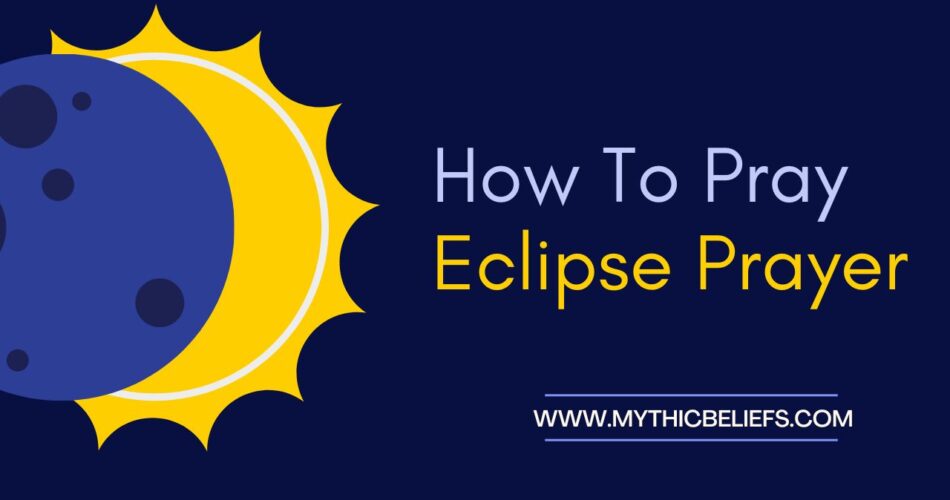A solar eclipse isn’t just a celestial spectacle—it’s also a spiritual moment for many. Across cultures and religions, eclipses have been seen as powerful omens, reminders, or even divine messages. In Islam, they’re a time of reflection, humility, and prayer. If you’ve never prayed the eclipse prayer before, don’t worry—I’ve got you covered. It’s simpler than you think, and I promise you won’t need a theology degree to get it right!
How Do You Pray Eclipse Prayer?
The prayer for an eclipse is called Salat al-Kusuf for a solar eclipse and Salat al-Khusuf for a lunar eclipse. But for now, let’s focus on the solar eclipse prayer since there’s a big one coming up in future — a total eclipse that’s set to cross parts of North America and Europe. Perfect timing, right?
So, here’s the deal: It’s a special type of prayer that’s longer than usual, performed in congregation if possible, but you can also do it alone (more on that in a bit). Unlike your regular prayers, it has two rakats (units of prayer), but each rakat has two rukus (bowings) instead of the usual one. Sounds a bit different, huh? Don’t worry, let’s break it down step by step.
- Start with niyyah (intention): Silently intend in your heart that you’re praying Salat al-Kusuf for the solar eclipse.
- Takbir (saying Allahu Akbar): Just like in any other prayer, raise your hands and begin.
- Recite Surah Al-Fatiha and a long surah: Many scholars recommend Surah Al-Baqarah or Surah Ya-Sin, but if that’s too long, go with what you know.
- Go into ruku (bowing): Stay in this position longer than usual.
- Stand up and recite again: This is where it differs from normal prayers. After rising from ruku, instead of going into sujood (prostration), you recite Al-Fatiha and another long surah.
- Go into ruku again: Yes, a second bowing in the same rakat.
- Now go into sujood (prostration): After the second ruku, continue as you would in a normal prayer.
- Repeat for the second rakat: The structure remains the same—two recitations, two rukus, and then sujood.
- End with Tashahhud and Salam: Finish the prayer as you normally would.
Sounds like a workout, right? But that’s the beauty of it—eclipses are rare, so the prayer is meant to be an extended act of devotion and reflection.
How Many Rakats Are There in Eclipse Prayer?
Two. That’s it. But unlike your typical prayer, each rakat has two rukus instead of one, making it unique.
Now, I know what you’re thinking—why the extra bowing? Well, the Prophet Muhammad (peace be upon him) prayed it this way, emphasizing the awe and submission we should feel during an eclipse. Think about it: The sun, which we rely on every day, suddenly disappears in broad daylight. If that’s not a moment for reflection, I don’t know what is.
Can You Pray Eclipse Prayer Alone?
Absolutely. While it’s encouraged to pray it in a congregation, especially in a mosque, you can definitely pray it alone if you’re at home, work, or somewhere without a congregation. Just follow the same steps and take your time with it. It’s a deeply personal experience—just you, your thoughts, and the reminder of how small we really are in this vast universe.
What to Recite During an Eclipse?
Besides the usual Surah Al-Fatiha, long surahs like Surah Al-Baqarah, Surah Ya-Sin, or Surah Al-Mulk are recommended. But if you don’t know them by heart, no worries! Just recite what you can. The essence of this prayer is sincerity, not memorization.
During the eclipse, it’s also common to engage in dua (supplication), dhikr (remembrance of God), and seeking forgiveness.
Fun fact: In the past, people feared that eclipses were signs of impending doom. Even some companions of the Prophet initially thought it was related to the death of his son, Ibrahim. But the Prophet clarified that eclipses are simply signs of God’s power—not omens of death or disaster.
A Final Thought…
Eclipses remind us of something profound: No matter how advanced we get, there are forces in this universe beyond our control. Praying during an eclipse isn’t about superstition; it’s about humility and gratitude.
So, if you get the chance take a break from your phone, step away from the chaos, and just pray. Even if you’re not Muslim, take a moment to reflect. Who knows? Maybe you’ll feel something bigger than yourself.
Have you ever prayed the eclipse prayer before? Or do you have any special traditions during an eclipse? Let me know in the comments—I’d love to hear your thoughts!
